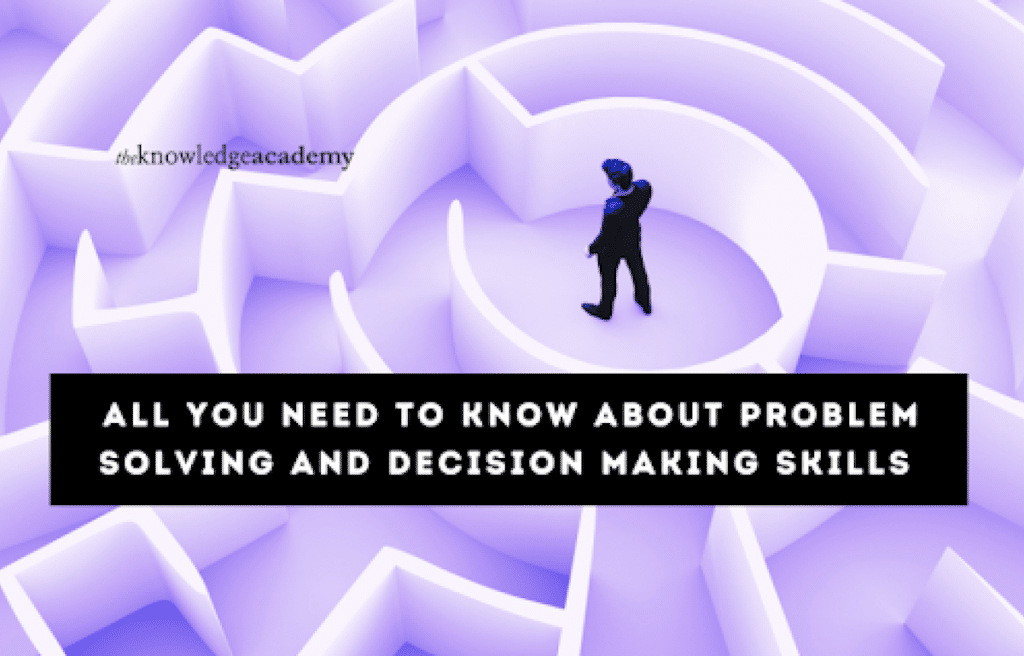We would have been overwhelmed with making significant decisions, wracking our brains! Imagine a situation where your decision could significantly impact your team’s success, and everyone would be anticipating a solution from you. How confident have you been in solving those problems with the right decisions? If you aren’t following the best practices and tools, you may feel lost while facing these challenges. A comprehensive Management Training Course can provide you with the tools to approach problems directly, transforming possible roadblocks into chances for development.
Let’s look at how to develop good Problem Solving and Decision Making skills can change how you respond to challenges and lead confidently.
Understanding Problem Solving Process
Fundamentally, problem solving is identifying a problem, generating feasible solutions, and acting to address it. Although this sounds simple, the truth is that problems occur in many forms, and strategic planning is needed to solve them. Clearly defining the problem is the first step towards a successful resolution. This entails comprehending the problem from all sides, weighing its underlying causes, and deciding on the intended result. Without a clear idea of the problem, any fix will be like a shot in the dark.
Once the problem is adequately defined, brainstorm various options. Here is where creativity gains significance; the most unique ideas often result from thinking outside the box. No matter how unusual they seem, one should consider all the possibilities. Lastly, after reviewing the possible fixes, it’s time to start using the best one. Meticulous preparation and execution are needed to make the solution consistent and successful. Effective resolution also includes constant monitoring and modifications.
Understanding Decision Making Process
Decision making is closely associated with solving problems. Choosing which action to follow is the next step after finding a possible solution. You will have to balance the benefits and drawbacks of each option together with their consequences. A SWOT analysis helps you understand the strengths and weaknesses of your decisions. This approach clarifies the possible results and assists with a wise decision making process.
Another effective tool is the Pareto Principle or the 80/20 rule. This implies that 20% of causes produce 80% of outcomes. Concentrating on the main elements with the most influence will help you make choices that optimise effectiveness and efficiency.
Effective Problem Solving Techniques
Various problem solving techniques simplify the process while considering the problem from different angles. These are some of the methods:
- Root Cause Analysis: This method seeks to find the foundational causes of an issue. A deeper investigation of the problem can help you create strategies that can prevent the problem from resurfacing.
- Brainstorming: A traditional method where team members produce various ideas and solutions cooperatively. By weighing all the available choices, you can promote innovation.
- Mind Mapping: A visual method for organising and investigating several facets of a problem. It helps you to see the relationships between several elements and spot trends that might not be obvious.
- The 5 Whys: It involves constantly asking “why” to probe deep into the underlying reason of an issue. Every response advances the following “why,” revealing the actual problem.
Smart Decision Making Strategies
Good results also depend on wise decisions. The following approaches can help you strengthen your ability to make decisions:
- Data-Driven Decisions: Make your choices based on solid data and evidence instead of depending on gut feeling alone. This method lowers prejudice and raises the possibility of a favourable result.
- Cost-Benefit Analysis: Analyse the possible advantages of any choice against the related expenses. This aids in selecting the one with the best net advantage.
- Scenario Planning: Consider several possibilities and their possible results. This helps to foresee potential difficulties and create backup strategies.
- Consultation: Ask others freely for guidance. Working with colleagues or consulting professionals could offer fresh ideas and help improve decision making.
Conclusion
It’s imperative for anyone, regardless of their position, to possess these skills. You can confidently confront problems with a systematic strategy and the right tools. These abilities can support you even in negotiating simple daily challenges and significant strategic decision making or dispute resolution. Investing in a management training course, like the one offered by The Knowledge Academy, can transform these much-needed skills.
